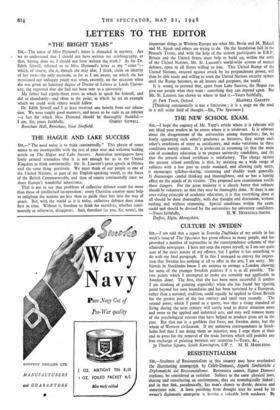THE HAGUE AND LAKE SUCCESS
SIR,—" The need today is to think continentally." This phrase of yours seems to me incompatible with the rest of your wise and welcome leading article on The Hague and Lake Success. Australian newspapers have lately printed reminders that it is not enough for us in the United Kingdom to think continentally. Mr. St. Laurent's great speech in Ottawa said the same thing positively. We must think of our people as one of the United Nations, as part of the English-speaking world, as the focus of the British Commonwealth, and then of course continentally since we share Europe's wonderful inheritance.
That is not to say that problems of collective defence count for more than those of intellectual co-operation: every Christian country must help to enlighten the nations no less than to guide their feet into the way of peace. But, with the world as it is today, collective defence does come first in time. Without it, freedom to think for ourselves, whether conti- nentally or otherwise, disappears. And, therefore (as you, Sir, wrote), the important things in Western Europe are what Mr. Bevin and M. Bidault and M. Spaak and others are trying to do. On the foundation laid in the Brussels Treaty, and with the help of the sixteen participants in E.R.P., Britain and the United States must help to build up, within the orbit of the United Nations, Mr. St. Laurent's world-wide system of mutual defence, open to all States willing to join. This United Rump of the United Nations, ensured against attack by its preponderant power, will then be able ready and willing to work the United Nations security system until the Rump becomes, to all intents and purposes, the world.
It is wrong to pretend that, apart from Lake Success, the Hague can give our people what they want: something they can depend upon. But Mr. St. Laurent has shown us where to find it.—Yours faithfully,
37 Park Town, Oxford. MAXWELL GaaNErr. [Thinking continentally is not a limitation ; it is a stage on the road to a still wider field of thought.—En., The Spectator.]


































 Previous page
Previous page